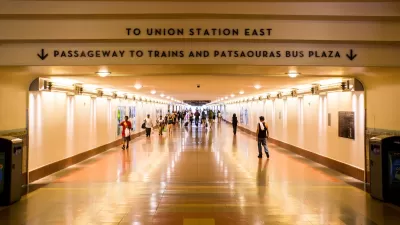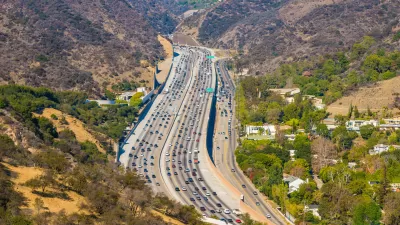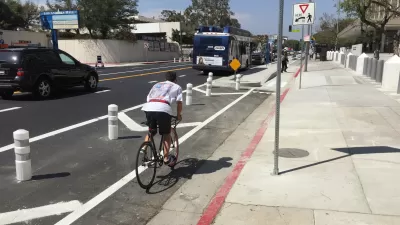A partnership between Waze and the city of Los Angeles has prompted a cry of "not on the street in front of my frontyard!" from residential neighborhoods around the city.
"The Waze traffic-avoidance app has begun sharing drivers' aggregated data with Los Angeles city and county traffic managers in exchange for information on street closures, detours and other data that make the app more useful," reports Sharon McNary.
McNary's coverage includes more details about the potential benefit of the deal to both of the parties involved. Los Angeles entered the agreement in October and announced during Mayor Eric Garcetti's State of the City Address in April.
Though Los Angeles is only one of ten cities to enter into the agreement, the unique relationship of the city's residents to their cars and the streets upon which they travel and park their cars, has prompted a strong response on the part of "Traffic NIMBYs" concerned about the number of drivers who use the app to more frequently access residential streets away from congested arterials and freeways. City Councilmember Paul Krekorian has even introduced legislation that would "reduce the impact of cut-through traffic that results from use of Waze and similar traffic apps," according to a separate article by Bianca Barragan.
Brian K. Roberts, author of L.A. Shortcuts: The Guidebook for Drivers Who Hate to Wait, written 25 years ago, pens an op-ed for the Los Angeles Times in response to pushback against Traffic NIMBYs, offering perspective about the clashing dynamics of public and private brought about by the controversy.
Roberts recalls being let off with a warning after making a turn that was once legal—before residents lobbied for changes to the street configuration in reaction to his book:
"Though I dodged a ticket, that traffic stop raised serious questions. How was it possible that a public street maintained with my tax dollars was no longer available to me? I wasn't speeding. I wasn't intoxicated. I had a valid license. It wasn't my fault that homeowners didn't look at a simple map or check the traffic patterns before they bought a house. Who were these people who had persuaded the government to give their private interests priority? What shortcut did they take every morning to get to work on time?"
One more of the best quotes from an op-ed full of provocative turns of phrase:
"Krekorian and other Waze critics — like the Brentwood woman who told the Associated Press recently that "the streets on the Westside are no longer a secret for locals, and people are angry" — should realize that the streets were never a secret meant for a select few and have been listed on maps at least since Wyatt Earp died here in 1929. Instead of blaming Waze, they should redirect their sense of entitlement to demand better mass-transit options that would reduce traffic for everyone."
FULL STORY: Will traffic NIMBYs ruin Waze?

Alabama: Trump Terminates Settlements for Black Communities Harmed By Raw Sewage
Trump deemed the landmark civil rights agreement “illegal DEI and environmental justice policy.”

Planetizen Federal Action Tracker
A weekly monitor of how Trump’s orders and actions are impacting planners and planning in America.

How Atlanta Built 7,000 Housing Units in 3 Years
The city’s comprehensive, neighborhood-focused housing strategy focuses on identifying properties and land that can be repurposed for housing and encouraging development in underserved neighborhoods.

In Both Crashes and Crime, Public Transportation is Far Safer than Driving
Contrary to popular assumptions, public transportation has far lower crash and crime rates than automobile travel. For safer communities, improve and encourage transit travel.

Report: Zoning Reforms Should Complement Nashville’s Ambitious Transit Plan
Without reform, restrictive zoning codes will limit the impact of the city’s planned transit expansion and could exclude some of the residents who depend on transit the most.

Judge Orders Release of Frozen IRA, IIJA Funding
The decision is a victory for environmental groups who charged that freezing funds for critical infrastructure and disaster response programs caused “real and irreparable harm” to communities.
Urban Design for Planners 1: Software Tools
This six-course series explores essential urban design concepts using open source software and equips planners with the tools they need to participate fully in the urban design process.
Planning for Universal Design
Learn the tools for implementing Universal Design in planning regulations.
Caltrans
Smith Gee Studio
Institute for Housing and Urban Development Studies (IHS)
City of Grandview
Harvard GSD Executive Education
Toledo-Lucas County Plan Commissions
Salt Lake City
NYU Wagner Graduate School of Public Service





























